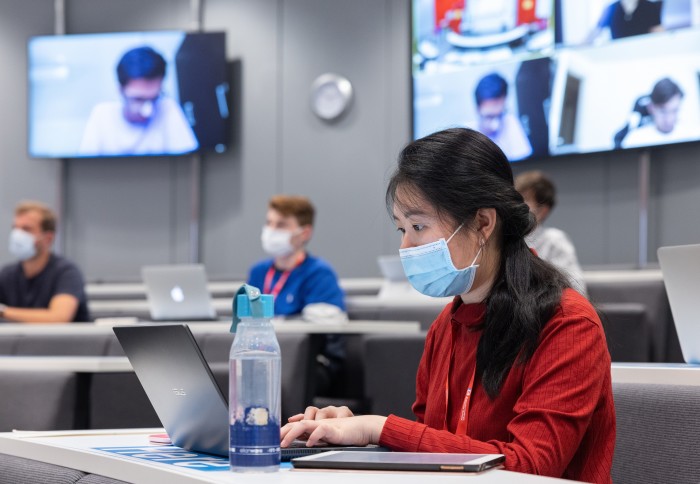Alice Gast: Universities must forge ahead with new frontiers

Imperial’s President Alice Gast says that universities must keep the positive changes brought on by the pandemic and forge ahead with new frontiers.
Writing for the World Economic Forum’s Davos Agenda, President Gast says the COVID-19 crisis accelerated changes that were on the horizon for universities.
 The Davos Agenda brings together heads of state and government, business and academic leaders, international organisations and civil society to share their outlook, insights, plans and solutions to the world's most urgent issues.
The Davos Agenda brings together heads of state and government, business and academic leaders, international organisations and civil society to share their outlook, insights, plans and solutions to the world's most urgent issues.
This year it will host a series of virtual panels, sessions and thought-leadership on areas such as education, climate change, innovation, pandemic preparedness and global economies.
"The crisis spurred invention and brought new ways of teaching and learning, innovative new ideas and advances in technologies." Alice P. Gast President of Imperial College London
President Gast has highlighted four ways that universities can future-proof education; embrace technology, optimise human interaction, personalise content, and reach more people.
President Gast writes: “The crisis spurred invention and brought new ways of teaching and learning, innovative new ideas and advances in technologies. Many changes will stay with us as we modernise our on-campus learning.”
HoloLens technology

Imperial has adopted new technology such as the Microsoft HoloLens, a holographic device that can stream a live video feed, enables medical students to “be there” with clinicians and patients.
Medical students experience teaching via a video feed, and are able to witness and interact with real-time exchanges between clinicians and patients.
The mixed-reality technology also enables the clinical live stream to be supplemented visually with digital information, such as the patient’s drug charts and treatment information or radiographs, which can be superimposed as holograms onto the environment.
Virtual field trips

Imperial has put on a number of virtual field trips which have taken our students to places not accessible during the pandemic. These were in fact pioneered before the pandemic with geology lessons from the surface of Mars.
During one virtual trip to the Pyrenees, students interpreted high-resolution photographs, Google Earth, and drone-scanned virtual models of geological formations. There were some unexpected advantages of conducting a field trip in this way, such as the detailed photo panoramas enabling students to observe more detail than they would have been able to in the field.
Lab in a Box experiments

A student-staff innovation team in the Department of Physics has transformed bulky experiments into portable labs, called ‘Lab in a Box', that can be mailed across the world to students' front doors.
The experiments, which try to match the experience of a real lab, introduce an element of flexibility and accessibility to our teaching which could hardly have been imagined a few short years ago.
Covid-19 online course

In early 2020, just weeks after the novel coronavirus was first observed, a group of leading public health experts and epidemiologists at the Jameel Institute launched an online COVID-19 course, called Science Matters: Let's Talk About COVID-19.
The course enrolled more than 140,000 people around the world as they learned how to gain a deeper understanding of Covid-19 and its spread.
--
READ THE FULL WEF AGENDA: Four ways universities can future-proof education
Article text (excluding photos or graphics) © Imperial College London.
Photos and graphics subject to third party copyright used with permission or © Imperial College London.
Reporter
Stephen Johns
Communications Division